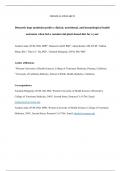Exam (elaborations)
Domestic dogs maintain positive clinical, nutritional, and hematological health outcomes when fed a commercial plant-based diet for a year
- Course
- Institution
Domestic dogs maintain positive clinical, nutritional, and hematological health outcomes when fed a commercial plant-based diet for a year Annika Linde, DVM, PhD, MPH1, Maureen Lahiff, PhD2, Adam Krantz, MS, DVM1, Nathan Sharp, BSc1, Theros T. Ng, PhD1, Tonatiuh Melgarejo, DVM, MS, PhD1 Aut...
[Show more]



